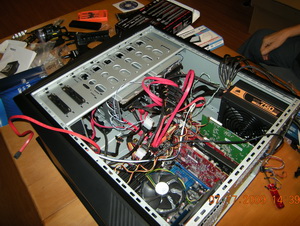Are You a Happy Geek?
I’m a geek. A nerd. I admit it. I’m old enough to remember when those words were considered insulting. I’m a child of the 70’s, and while I was never part of the popular crowd in high school, I was never an outcast either, mostly because the jocks and  popular kids needed help with their homework. I had a computer long before the high schools even thought it was important. In fact, I was the second person in my small Texas home town to buy the new Radio Shack TRS-80 Model 1 computer, for a whopping-at-the-time $500 (around $2000 in today’s dollars). At least there was one person in town geekier than me!
popular kids needed help with their homework. I had a computer long before the high schools even thought it was important. In fact, I was the second person in my small Texas home town to buy the new Radio Shack TRS-80 Model 1 computer, for a whopping-at-the-time $500 (around $2000 in today’s dollars). At least there was one person in town geekier than me!
When I graduated and started working my way through the world of information technology, being a geek really paid off. In the days before Windows, even before desktop computing, being in “IT” meant you spoke another language. Even after DOS and Windows became a standard, for a long time “IT” was mostly a mystery to the business and the “IT guys” lived in their own world. Often the user was scoffed at for not understanding the nuances of the mysterious machine that sat on their desk. Quite often “IT” was despised by the ‘User,’ but considered a necessary evil in the blossoming world of business technology.
We live in a very different world today. Being a geek is considered a badge of pride by many, and knowledge of the formerly mysterious world of computers is commonplace. There’s even a popular TV show about us (I highly recommend The Big Bang Theory!) Computers are everywhere, and be it a Mac or a Windows PC, chances are everyone has some sort of computing device at home. Today, ‘Users’ are often as knowledge-able about desktop computing as dedicated computer technicians. Many of them have an expert understanding of applications and some may even have a basic appreciation of application development. Gone are the days of the “IT guys” speaking gibberish in an elevator; now the ‘User’ not only understands but may even be able to join in the conversation!
What this means for us is our job has simultaneously become easier and more difficult. We don’t really support ‘Users’ anymore. Today, we have clients who have clear expectations of what they want from technology. It is easier in the sense that our clients can articulate their requirements better. It is harder because often the computing experience at home is vastly different from that in the work environment. For example, a business manager may have a need for a particular type of application. At home, it might be easily downloaded from the internet as freeware, shareware, a demo, or even illegally from a random web site. It’s instant gratification at its best. In the work environment, there are processes to control and prevent this behavior. The client may not understand that their simple need is much more complex because of all of the potential issues with adding a new application to the environment. Getting the approval for the new application, or getting it approved as a project for internal development can be a frustrating experience simply because the client doesn’t understand that there is a vast difference in the computing experience at home or at work
This results in one of the biggest changes that we tech geeks must embrace. In a word, it is simply communication. In the past, the ‘user’ threw a request over the wall to IT, and after some ‘magic’ happened IT would deliver a solution that may – or may not – satisfy the original need. Today, the client expects to be much more engaged in the process; they expect to be informed and understand what is happening. As technology professionals we must be able to meet that need.
Today, Information Technology exists for one purpose: support the needs of the business. We must understand how we contribute to the corporation’s ‘big picture,’ and structure what we do to best meet the needs and goals of the company. Every person in a corporation has a role to play, from the desktop support analyst out amongst the business providing face-to-face support, to the managers who strive to make sure needed resources are in place and effective, to the application developers who provide the tools, and the senior leaders who provide the strategic direction.
Today, we can all be proud to be Geeks, because the business runs on the infrastructure we deliver and maintain. We play a critical role; an important one that we can be confident stands out in our industry. I’m happy to be a Geek! Are you?